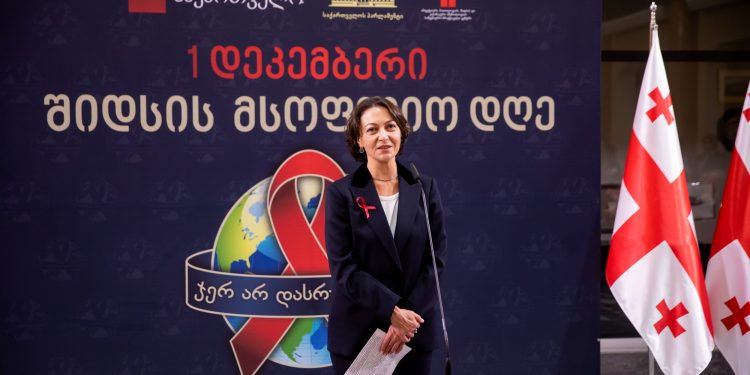The AIDS Health Fund (AHF), in commemorating World AIDS Day, reminds world leaders, international institutions of health, and civil society, that there is much more to be done.
AHF Georgia, as in previous years, participated in the World AIDS Day Campaign with various activities. A meeting was held at the Parliament of Georgia, with the support of Health and Social Affairs Committee.
Every year, on December 1, the entire world celebrates World AIDS Day. The AIDS Health Foundation marks this year’s campaign by reminding world leaders and public health institutions that the AIDS epidemic is not yet over and there is much work to be accomplished. UNAIDS’s report for 2021 states that there are 1.5 millions cases of AIDS in the world, which is one million more than what was set as a global target. Georgia is a member of the group of countries that have a low prevalence of AIDS. This is due to the combined efforts of the Georgian Government, Public Health Institutions, and health organizations. To maintain this result, testing, treatment and attention to late referrals are very important. Testing is the only method to detect HIV infection. Therefore, timely treatment and testing help suppress the virus. Treatment is important for prevention, because a person undergoing therapy is no longer contagious”, said Nino Khetaguri. Program manager of the AIDS Healthcare Foundation (AHF) Georgian Representative Office.
Zaza Lominadze gave a speech as the chairman of Health and Social Affairs Committee of Georgia’s Parliament. According to him it is important that Georgia has made great progress in the fight against AIDS in the past decade. This is due to the fact that Georgia has a policy of health care that is people-oriented. The country now has AIDS treatment available, so the most important thing is to treat and prevent the disease as soon as possible. Zaza Lominadze urged the society to show solidarity and unity in the fight against stigmatization and discrimination.
“It is important to note that the number of AIDS patients, particularly in Eastern Europe, has increased. Today’s purpose is to remind the society that AIDS has not yet been eradicated. We urge everyone to be tested and call on world leaders unite in the battle against AIDS. Health care is a state-led policy that puts the people first. Georgia has made significant progress in the last decade in the fight against AIDS. The goal is not to let the hard work of the government go to waste. We also call on the society to unite in order to fight stigma and discrimination towards people suffering from AIDS,” said Zaza Lominadze.
Irma Khonelidze, the Deputy Director of National Center for Public Health and Disease Control addressed the invited audience. According to a report from the World Health Organization and European Center for Disease Control, 2.3 millions people in the WHO European region are HIV positive. In the past two decades, 24% less cases have been reported compared to the pre-pandemic era. The issue of detection is therefore even more urgent. Our country has made great progress in terms treatment efficiency but there is still much to be done when it comes to disease detection. To detect disease, regular testing is crucial. We must also create an environment that minimizes stigma and discrimination. In recent years, innovations such as self-testing or access to testing using contactless devices were introduced. In terms of testing, we do not have an appalling situation in the country. According to a global report, Georgia has 442,000 tests per year. This puts it in a good position in the region. However, to detect the disease we need to improve the environment where people are willing to come and get tested.
Nika Chkhartishvili, deputy director of the Scientific-Practical Center of Infectious Pathology, AIDS, and Clinical Immunology, presented statistics about Georgia and spoke of the importance of screening and prevention. “This is a serious disease that anyone can get. No one is immune.” HIV (the human immune deficiency virus) can be contracted by anyone, but certain behaviors increase the risk. Georgia is a leader in Eastern Europe when it comes to anti-viral treatments for HIV/AIDS patients, and the rates of viral suppression (indeterminacy) among patients undergoing treatment. Since 2015, Georgia has been the first country in Eastern Europe, and one of the very first countries in the world to implement the “treat-all” principle. This means that all HIV-positive people are treated regardless of their immunity status and stage of disease. This approach has already produced significant positive results.
The event also included anonymous and free testing. The winners of the competition announced in Georgia by the representative of AIDS Healthcare Foundation, were also awarded within the framework of the event. The event was attended by representatives from the medical field, civil society and parliamentarians.
In conjunction with World AIDS Day, a variety of activities were held across the country to raise awareness and remind people that by uniting society, it is possible for the AIDS pandemic to be ended. Tbilisi State Medical University student volunteers participated in the distribution and dissemination of information about the disease. The activity began in the area surrounding the parliament building. Informational materials were distributed to the Georgian-American University and the University of Georgia. World AIDS Day aims to raise awareness about the disease and reinforce the idea that the pandemic is a thing of the past if we work together.
According to the latest UNAID stats, there are currently more than 38 millions people living with HIV in the world. Since the beginnings of the AIDS crisis, more than forty million people have died from HIV-related diseases. Despite the fact that many people who are infected today benefit from antiretroviral treatment, there are still patients who lack access to medicine. UNAID reports that 1.5 million new infections were reported last year, which is over 1 million more than what was targeted globally. Around 650,000 people died from AIDS-related diseases. AHF calls on the world to renew the fight against AIDS and intensify the calls for testing and treatments, as well as address the problem with late referrals in honor of those who continue to fight or have lost their lives to AIDS-related illnesses. AHF has organized a number events in 45 countries including virtual conferences. AHF representatives are working to bring HIV and people living with HIV back into the spotlight.
Visit the official AHF pages on Facebook and Twitter for more information.
www.aidshealth.org
www.facebook.com/aidshealth
Read More @ georgiatoday.ge




